Installing Collector on Windows
Follow the steps in this topic to install or uninstall an OpenTelemetry Collector on macOS. See OpenTelemetry Collector for information on other operating systems.
System Requirements
Minimal resource requirements are the following:
- 200 MB of disk space
- 64 MB of RAM
Supported Versions
- Windows 10 and up, Windows Server 2016 and up
Install
You can install our OpenTelemetry Collector using either of the following methods:
Install Script
A single line installation powered by Install Script.
Get the Installation Token
Get your installation token if you don't have it already. We are going to refer to this token as <TOKEN> in next streps.
Run Installation Script
Run the following command in the same PowerShell window, replacing <TOKEN> with your token from previous step:
Set-ExecutionPolicy RemoteSigned -Scope Process -Force; [System.Net.ServicePointManager]::SecurityProtocol = [System.Net.ServicePointManager]::SecurityProtocol -bor 3072; $uri = "https://raw.githubusercontent.com/SumoLogic/sumologic-otel-collector/main/scripts/install.ps1"; $path="${env:TEMP}\install.ps1"; (New-Object System.Net.WebClient).DownloadFile($uri, $path); . $path -InstallationToken "<TOKEN>" -Tags @{"host.group" = "default"; "deployment.environment" = "default"}
The script is going to perform the following operations:
- Install or upgrade operation by placing the latest version as
C:\Program Files\Sumo Logic\OpenTelemetry Collector\bin - Get static configuration and place it as
C:\ProgramData\Sumo Logic\OpenTelemetry Collector\config\sumologic.yaml - Create user configuration directory (
C:\ProgramData\Sumo Logic\OpenTelemetry Collector\config\conf.d) withcommon.yamlfile which will contain installation token - Create
OtelcolSumo(Sumo Logic OpenTelemetry Collector) service
Script Options
| Name | Description | Takes Value |
|---|---|---|
-InstallationToken | Installation token | Yes |
-Tags | Sets tags for collector. This argument should be a map. | Yes, for example @{"host.group" = "default"; "deployment.environment" = "default"} |
UI Installation via App Catalog
- Go to App Catalog and select Windows - OpenTelemetry.
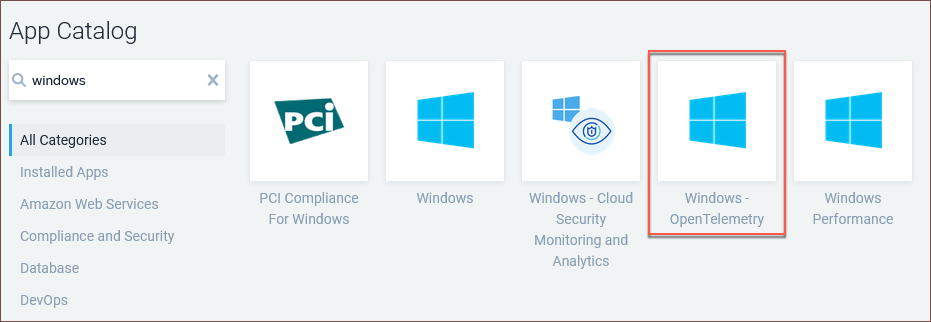
- Click Install App for your first installation, or View Details, then More Actions and finally Add another Host for next installation.
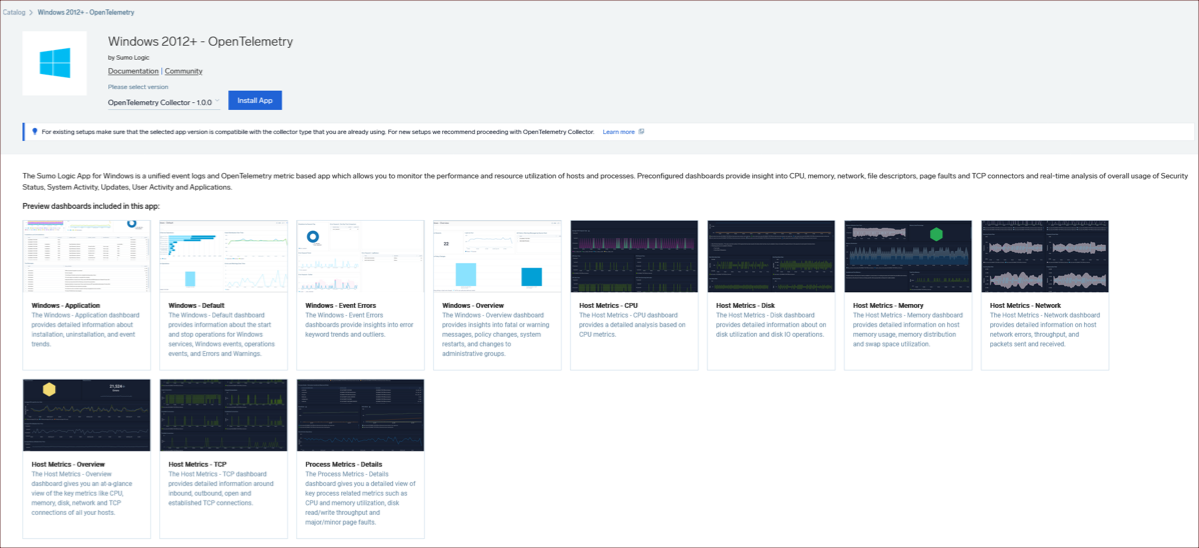
- Select Add New Collector and click Next.

- Select the installation token and customize your tags.
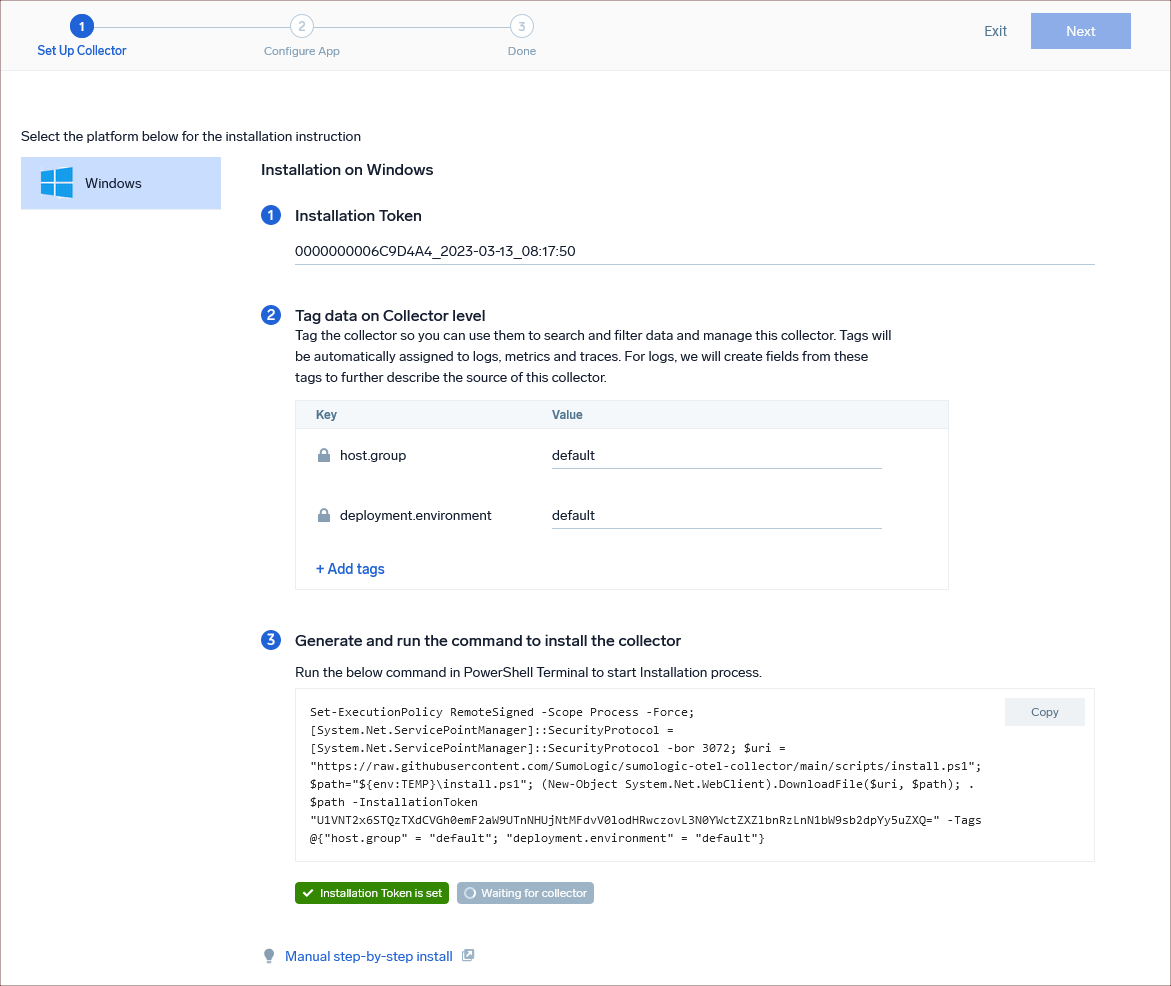
- Open Powershell.
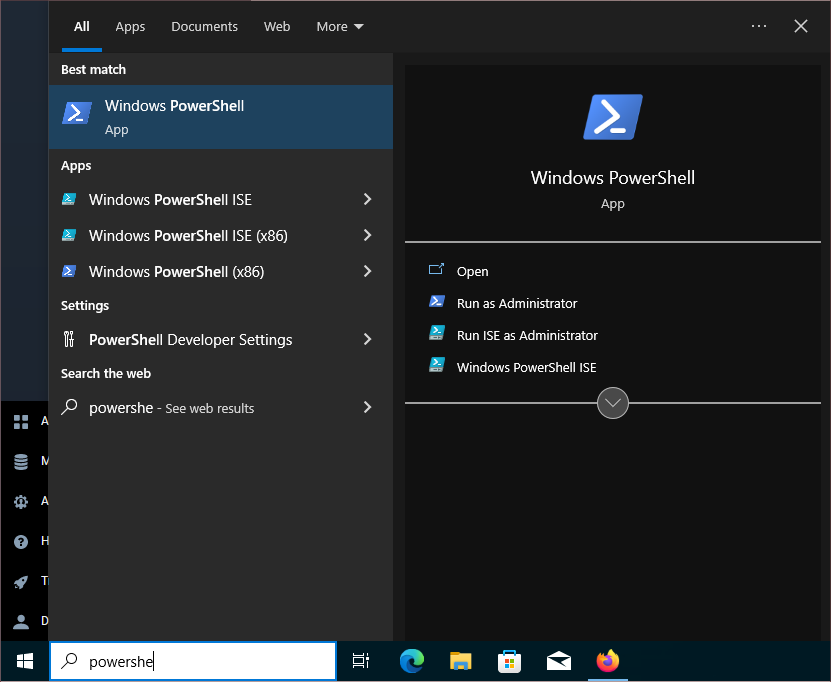
- Copy the installation command to PowerShell, run it, and click Next after the successful installation.

- Customize the configuration, download it, and save it in the desired location.
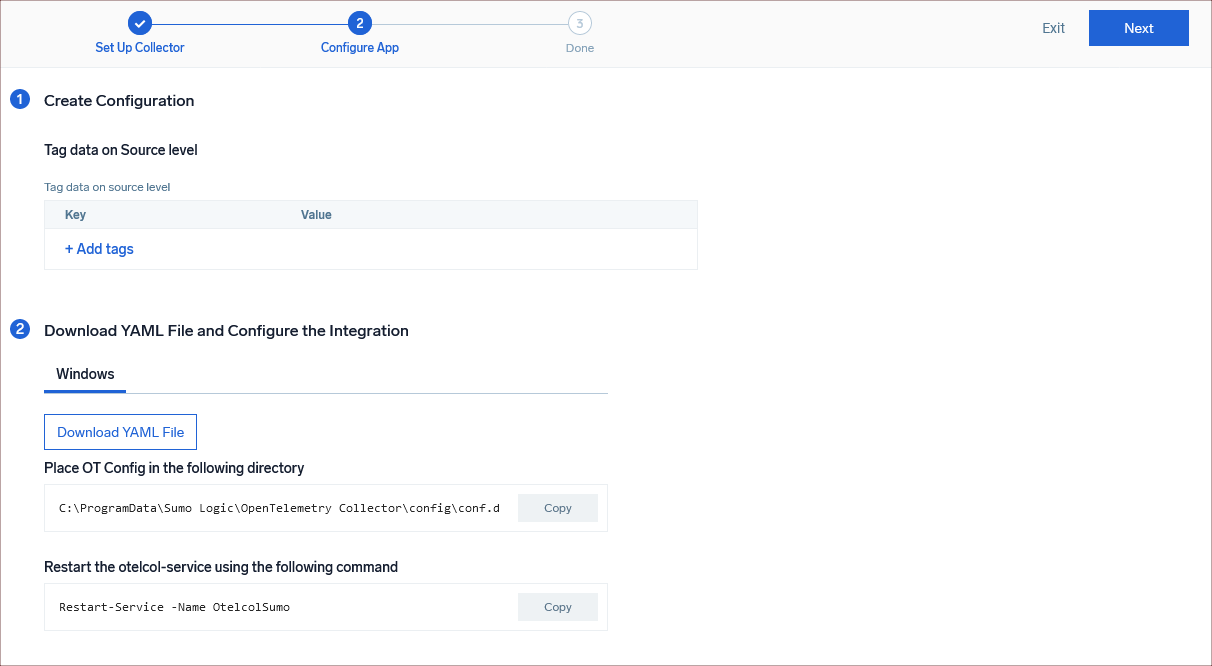
- Open Powershell as an Administrator and restart the service by running this command.

- Wait for the dashboards to be installed and for data to be ingested into Sumo Logic.

Manual Step-by-Step Installation
- Go to the latest release documentation.
- Download
otelcol-sumo_x.y.z.0_en-US.x64.msifrom theAssetssection.
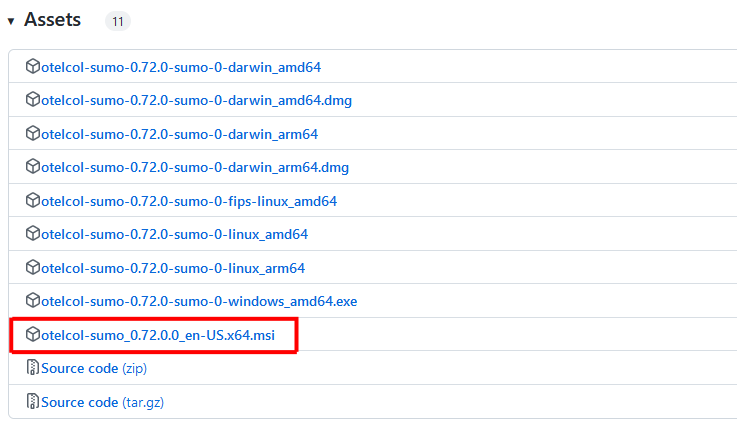
- Run Installer.
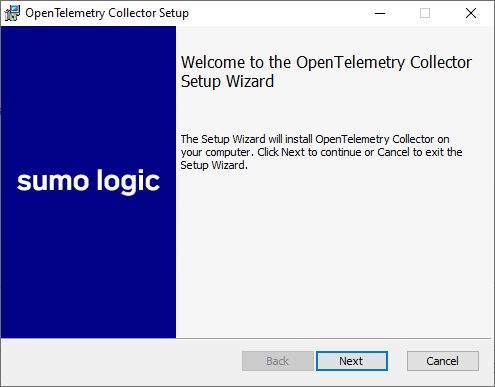
- Read and accept End-User License Agreement.
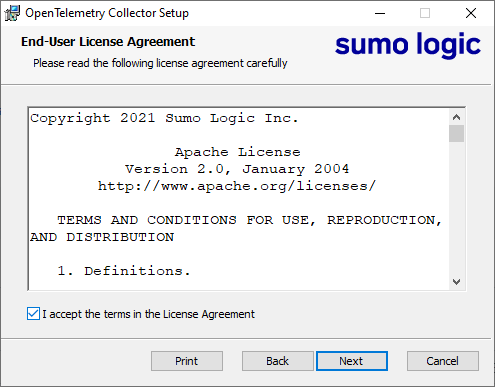
- Select binary destination.
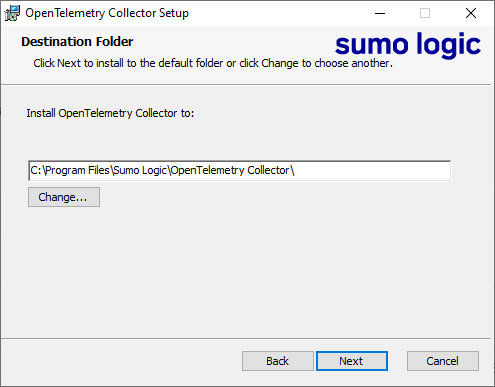
- Set Installation Token and Tags properties.
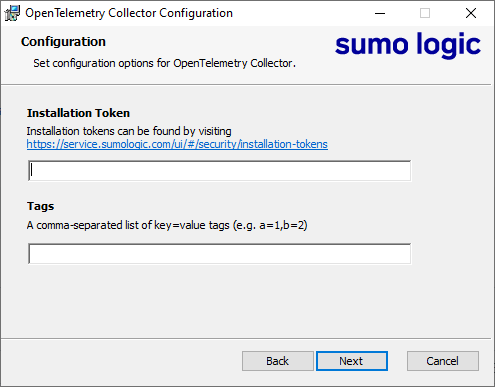
- Click Install to begin installation.
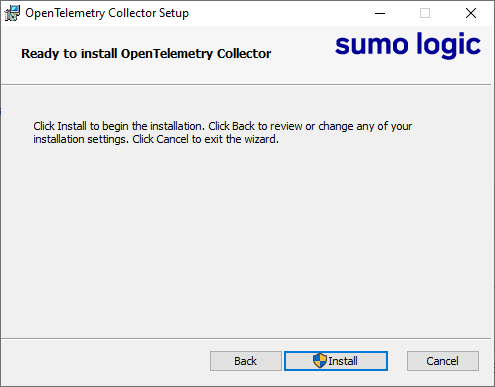
- Wait for installation to be completed.
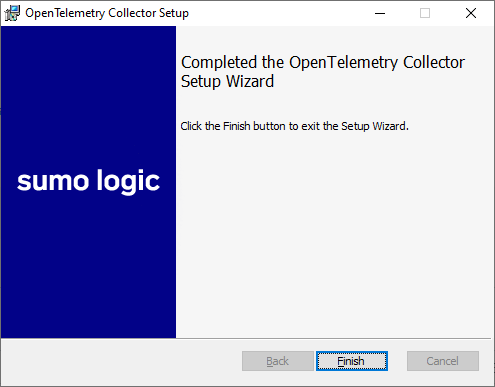
- You can modify configuration, which should be placed in
C:\ProgramData\Sumo Logic\OpenTelemetry Collector\configdirectory.noteC:\ProgramDatadirectory is hidden by default.
Verify the Installation
Run the following command in PowerShell:
> Get-Service OtelcolSumo
Status Name DisplayName
------ ---- -----------
Running OtelcolSumo Sumo Logic OpenTelemetry Collector
Alternatively, you can open Services.msc and check whether Sumo Logic OTel Collector Service is running or not.
Additional Settings
This section describes common OpenTelemetry customizations.
Using Proxy
Exporters leverage the HTTP communication and respect the following proxy environment variables:
HTTP_PROXYHTTPS_PROXYNO_PROXY
You can set it by adding the following properties to Windows Registry key HKLM:\SYSTEM\CurrentControlSet\Services\OtelcolSumo\Environment:
FTP_PROXY=<PROXY-ADDRESS>:<PROXY-PORT>
HTTP_PROXY=<PROXY-ADDRESS>:<PROXY-PORT>
HTTPS_PROXY=<PROXY-ADDRESS>:<PROXY-PORT>
To exclude a specific domain or IP address from using the proxy, you can add it to the NO_PROXY environment variable. For example, to exclude the domain sumologic.com from using the proxy, you can add the following line:
NO_PROXY=sumologic.com
Restart Sumo Logic OpenTelemetry Collector (OtelcolSumo) service to apply the changes.
FIPS
We currently do not build FIPS binary for Windows.
Refer to BoringCrypto and FIPS compliance in our repository for more details.
Uninstall
- Go to Add or remove programs.
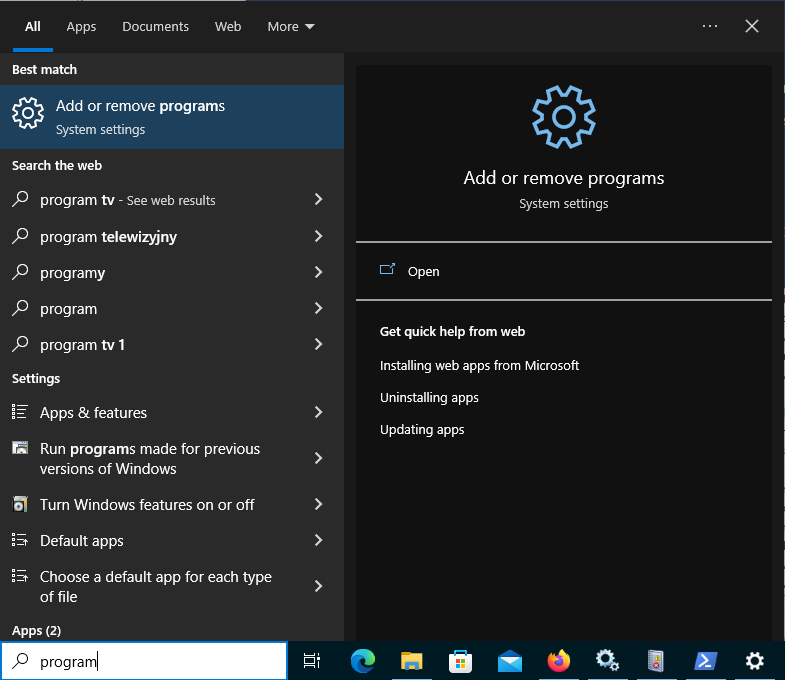
- Find OpenTelemetry Collector and click Uninstall.
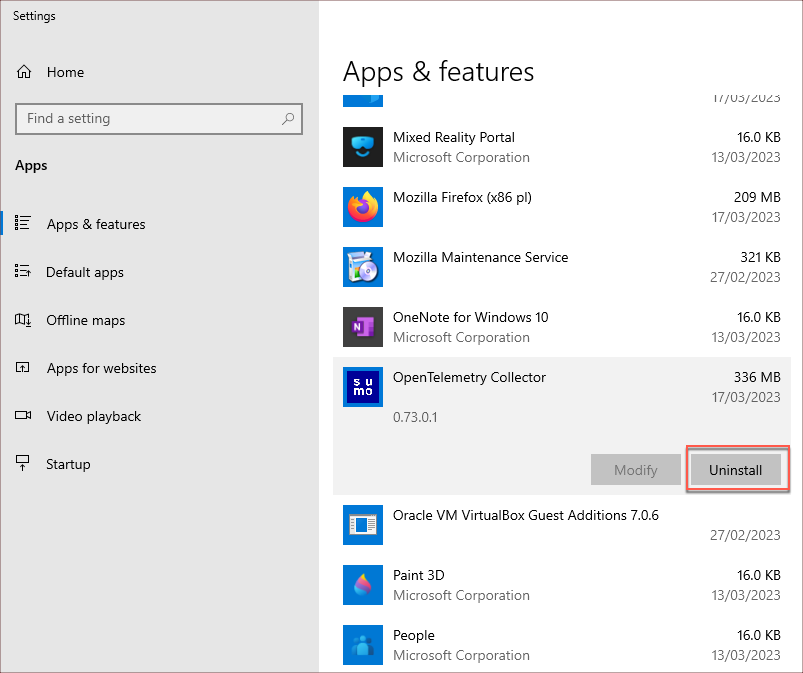
- Confirm the uninstallation.
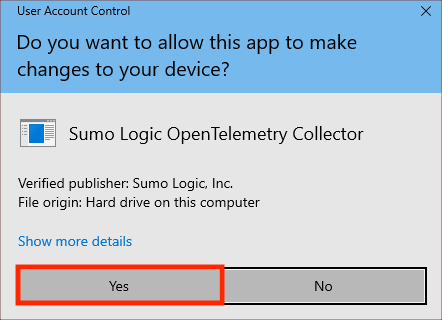
Upgrading the Collector
To upgrade the collector perform installation step and it will automatically upgrade the binary in-place.
Troubleshooting
Cannot restart service during Installation
If you get the following output while restarting the service:
> Restart-Service -Name OtelcolSumo
Restart-Service : Service 'Sumo Logic OpenTelemetry Collector (OtelcolSumo)' cannot be stopped due to the following
error: Cannot open OtelcolSumo service on computer '.'.
At line:1 char:1
+ Restart-Service -Name OtelcolSumo
+ ~~~~~~~~~~~~~~~~~~~~~~~~~~~~~~~~~
+ CategoryInfo : CloseError: (System.ServiceProcess.ServiceController:ServiceController) [Restart-Service
], ServiceCommandException
+ FullyQualifiedErrorId : CouldNotStopService,Microsoft.PowerShell.Commands.RestartServiceCommand
Ensure that you run PowerShell as an Administrator.
For information on troubleshooting and solutions, refer to the Troubleshooting and FAQ.